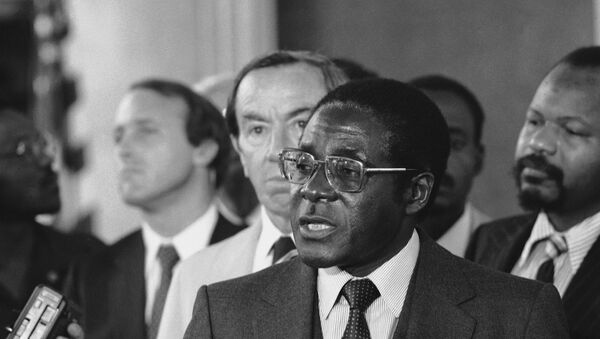The name Robert Mugabe was synonymous with the black African’s heroic struggle against overlordship by the white man in the 1970s but ask anyone under the age of 30 today and they will say he was just a corrupt dictator.
So what went wrong?
In the mid 1970s southern Africa was a totally different place from today.
Portugal was refusing to give up its colonies in Angola and Mozambique - they would only withdraw after the Carnation Revolution in Lisbon in 1975 - South Africa was under the grip of a brutal apartheid regime and white settlers under Ian Smith had made a unilateral declaration of independence in Rhodesia and were ruling the former British colony without any regard for the black majority.
— Economic Freedom Fighters (@EFFSouthAfrica) September 6, 2019
Rhodesia - which would later be renamed Zimbabwe after an ancient African kingdom which ruled the region - was wracked by civil war in the 1970s.
Smith’s government, backed by South Africa, had a well-equipped army of tanks and helicopters which maintained rule against an insurgency by black guerrillas.
— Kate Hoey (@KateHoeyMP) September 6, 2019
Zimbabwe is composed of two main tribes - the majority Shona and the minority Ndebele - and there were two rival guerrilla armies.
Mugabe led ZANLA, which drew its strength from the Shona people, while his great rival Joshua Nkomo led the mainly Ndebele ZIPRA.
They maintained an uneasy alliance against Smith’s government in the capital, Salisbury (now Harare), but their Patriotic Front rarely threatened to take over militarily.
But in 1979 Margaret Thatcher’s new government decided to broker talks between the two sides and eventually they hammered out the Lancaster House Agreement.
A year later Smith handed over power and Mugabe became the first Prime Minister in 1980 after ZANU, the political wing of ZANLA, defeated Nkomo’s party ZAPU.
— Tariro Mzezewa (@tariro) September 6, 2019
For a few years Mugabe was a moderate leader, learning the ropes and gradually gathering state power.
He said: “It could never be a correct justification that because the whites oppressed us yesterday when they had power, the blacks must oppress them today.”
But in 1983 he initiated the Gukurahundi massacres, which would last for four years and involved a brutal crackdown on the Ndebele and particularly former ZIPRA fighters.
Nkomo went into exile and in 1987 became President and turned the country into a one-party state.
In the 1990s, with the economy starting to stagnate, he decided to make the white minority the scapegoats and seized hundreds of farms, which he handed over to ZANLA war veterans.
Mugabe told the white farmers: "You are now our enemies because you really have behaved as enemies of Zimbabwe. We are full of anger. Our entire community is angry and that is why we now have the war veterans seizing land."
— Mark Lawrenson (@MTLawrenson) September 6, 2019
As white farmers fled the country the agriculture-based economy started to tank in the late 1990s but Mugabe would not admit he was wrong and instead cracked down on dissidents.
In 2004 Mugabe turned 80 but he refused to step down and hand over to a younger leader who might have fresh ideas and instead lashed out at the British and other critics, claiming Zimbabwe was the victim of an imperialist plot.
Mugabe said in 2008: "Only God who appointed me will remove me - not the (opposition) MDC, not the British."
— Otto English (@Otto_English) September 6, 2019
He also described the British as “violent people, liars, scoundrels and crooks.”
One of his strangest quotes, in 2003, was: "I am still the Hitler of the time. This Hitler has only one objective, justice for his own people, sovereignty for his people, recognition of the independence of his people. If that is Hitler, then let me be a Hitler tenfold."
Mugabe’s first wife Sally had died in 1992. She was seen as a stabilising influence.
Four years after her death he remarried but his second wife, Grace, was only interested in power and wealth.
She was notorious for flying to Paris or London in private jets and shopping extravagantly while back home ordinary Zimbabweans starved in poverty.
— Quentin Letts (@thequentinletts) September 6, 2019
Mugabe hated homosexuals and in 2013 said: "(President Barack) Obama came to Africa saying Africa must allow gay marriages... God destroyed the Earth because of these sins. Weddings are for a man and a woman."
He was out of kilter with the 21st century but he soldiered on, despite frequent challenges by MDC leader Morgan Tsvangirai - who died last year - and then made a fatal mistake.
He tried to install his wife as his successor.
This enraged Emmerson "The Crocodile" Mnangagwa, the military strongman and leader of the Lacoste faction, who led a military coup against Mugabe in 2017.
Mugabe was forced to step down as President, aged 93, as Mnangagwa took over and ZANU (PF) stayed in power.
Few will mourn Mugabe in Zimbabwe, a country he turned into a banana republic and one of the poorest countries in the world.
In 2012, commenting on false reports that he had died, Mugabe said: "I have died many times. That's where I have beaten Christ. Christ died once and resurrected once. I have died and resurrected and I don't know how many times I will die and resurrect."




